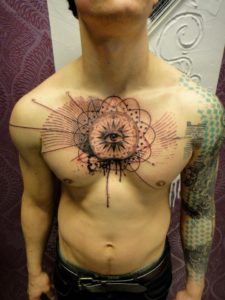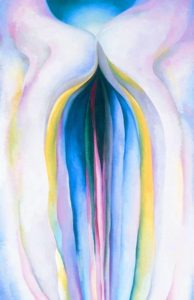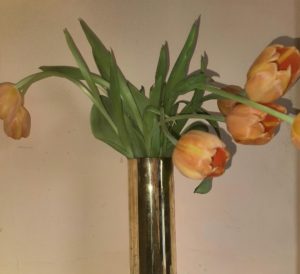Still Delight —
a Sonnet Sequence on the Life, Loves and Lines of
RUPERT BROOKE
O for the muse of fire . . . Erato
Modern poetry modern verse contemporary poetry contemporary verse modern poem contemporary poem
Rupert Wanted Surrender
“Love is a breach in the walls, a broken gate.
Love sells the proud heart’s citadel to fate.”~ Rupert Brooke
Would women be as likely as a man
To write such sentiments, to think of love
As breaching walled in strength, as Æthelstan
Attacking York? Would Ecgwynn think that shove
And cracks were what a woman’s love should be
About, or would she judge that love is more
A matter of a mother’s chestnut tree
That brings forth candles and its nuts galore
In season? Would a woman think a gate
Should be a battered door in love’s attack?
Indeed, would women feel that love is fate
Like battering rams deployed by maniac
Testosterone? The fortress men protect
Is pride. That swell is what must not be wrecked.
~ Phillip Whidden
“Apollo is here, divinely cruel, and Dionysus, who maddens by his presence”
Modern poetry modern verse contemporary poetry contemporary verse modern poem contemporary poem
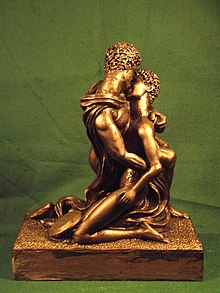 Apollo and Hyancinthus
Apollo and Hyancinthus
Abandoning Olympus when One God
Arose from death, the Greek gods fled
To English public schools. A football squad
In Rugby had new deities; so said
The poet Rupert Brooke. They walked across
School fields in flannels that he wanted to . . .
Take down. Much, much, much more than a coin toss
He had in mind. He wanted them to spew
A nectar much more potent than the one
That Ganymede had served to great God Jove.
The poet wanted equal sorts of fun
That Jupiter had had inside a grove
Of olives with the gorgeous boy back then.
Brooke wanted god-like joy with these young men.
~ Phillip Whidden
Him For Us . . .
The rooms in School House echoed with the sound
Of words he spoke, his steps along the hall,
His laughter, even shouts. The outside ground,
In, say, the Close, though large, was far too small
For such a mind and soul. You might arrange
To kill him in an epic war, but death
Was tiny set beside him. It was strange
To him. His poetry, a shibboleth
That Keats had spoken as his native tongue,
Preserved young Rupert like a Pharaoh set
To rise to stars and raised his verses rung
By rung on Jacob’s ladder till he met
That place perfection makes for boys like this
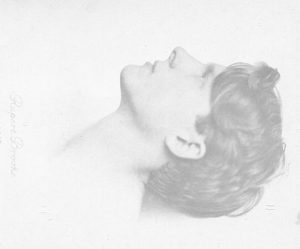
……………………………………………………………………………………………………………………….
………………………………………………………………………………………………………………………
………………………………………………………………………………………………………………………
.And left him . . . as enlightenment and bliss.
~ Philllip Whidden
“Legendary Beauty” and “Rugby and Eton”–A Foursome of Sonnets
Modern poetry modern verse contemporary poetry contemporary verse modern poem contemporary poem
Legendary Beauty
“Incredibly, inordinately, devastatingly, immortally, calamitously, hearteningly, adorably beautiful.”
“the handsomest young man in England” ~ W. B. Yeats on the appearance of Rupert Brooke
What makes up legendary beauty in
A man, enough to make the “normal” guy
Be smacked by it and make him want to sin
With it? When Yeats remarked on how the eye
Saw gorgeousness, he said that Brooke was at
The top of English masculinity
In fetchingness. Young Yeats was no slouch hat
Himself; no, in the same vicinity
Of sexiness as Rupert. Sedgwick called
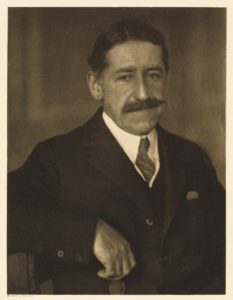 Ellery Sedgwick
Ellery Sedgwick
Out to his wife, “I have seen Shelley plain!”
“Man’s beauty is much more rare”: so enthralled
The editor was he could not refrain
From shouting up the stairs to tell his spouse
Inside their Rupertless marital house.
Rugby and Eton
Why Shelley? Percy wasn’t stunning as
That poet Sedgwick had been dazzled by.
Bysshe simply didn’t have the razzmatazz
Of killing gorgeousness that struck the eye
Of Sedgwick. Shelley had a sweetheart mouth
And wavy hair but nothing like the face
Of Brooke. Though delicate and not uncouth,
The head of Shelley wasn’t like the ace
In royal flushes. Edward Williams might
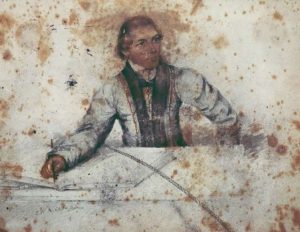 Edward Elleker Williams
Edward Elleker Williams
Have disagreed. These two were meant to love
Each other after they had died. The rite
To burn their bodies lifted them above
Mere death. Both men were married but they aimed
To be entombed as one, always inflamed.
“The worst of slaves is he whom passion rules.”~ Rupert Brooke
So is it any wonder that young James,
The brother of bent Lytton Strachey, should
Be stunned by Rupert and be caught in flames
Of unrequited lust for his boyhood
Fixation once his Brooke had blossomed like
A mythic Grecian flower with armpit hair,
So sexy that he could have been a spike
That Dracula drove through him like despair?
This stake was almost six feet tall, myth sweeps
Of hair of goldy, auburn, brown, mixed through,
Had deep-set eyes designed to torture, heaps
Of manliness to manage James’ heart’s coup,
Not mentioning that shapely manly mouth
And other strengths as James’ eyes travelled south.
“There’s little comfort in the wise.”~ Rupert Brooke
It seems that everyone who met Brooke felt
Compelled to cite his hunkiness once he
Had left his school. The women’s guts would melt
And men would suffer Cupid’s harsh decree,
But Brooke was captured hard inside his cage,
Lust’s kinkiness for Lascelles. James would write
To all about his torture, in a rage
Of whinge, as pitiful as it was trite,
But Lytton didn’t pity him as much
As sneer at his distraction. Lytton thought
That he at least would not desire to touch
The poet, never wanting to be caught
Up in the frenzy—only to be “snubbed.”
Brooke wriggled, picky, about whom he rubbed.
~ Phillip Whidden
Wider Still and Wider from the Earth
“And in that Heaven of all their wish, there shall be no more land, say fish.”
The fancies of that young one, Rupert Brooke,
Were wider than “just” girls and women. He
Liked those—and more. The autumn hair that shook
Him was the head of Charles Lascelles. Its plea
Lodged sharply in the poet’s heart, twanging
Like arrows when they first embed their points
In targets on the field. The waves hanging
Along that forehead struck him. Shoulder joints
Became obsessions whether he could spy
Their armpit hair or not. Their upper arms
Were potions like Isolde’s. Then when an eye
Met his, he felt its glories and its harms.
Those gorgeous harms went ricocheting through
His ribcage, whether they were brown or blue.
~ Phillip Whidden
The Genius of Love and the Jock
Modern poetry modern verse contemporary poetry contemporary verse modern poem contemporary poem
Of course it doesn’t matter that we don’t
Know just how beautiful Lascelles was: he
Was not a poet. Rupert Brooke was wont
To think the object of his love loomed free
Of flaws. The eye of this beholder ached
As every lover’s does with craziness.
That vampire thing called love is better staked
Right through its heartlessness. Love’s haziness
Prevents the tortured chest from seeing truth.
Testosterone produces dreaminess
When it is commandeered by swelling youth
With all its hairiness and steaminess.
If portraits of Lascelles were found, he yet
Would just be flesh the genius yearned to pet.
~ Phillip Whidden
Rugby Love Reduced to Black and White in Cambridge Love
That love continued into Cambridge days.
One Rugby beauty took another in
A frame and kept him in his room to gaze
At eyes, at stalwart auburn hair, and chin,
Not just in daytime, either, but in nights
Of loneliness without warm flesh and shape
Of truth, “truth beauty.” Keats had known the heights
Of love frustrated. Even just the nape
Of solid neck in strength would likely be
Enough in Rupert’s mind to torture love
Like sweated heart, but then he could not see
From frontal view the shaft that rose above
The back of Charles as Brooke had seen it on
The playing field, that swelling skin of brawn.
~ Phillip Whidden
Etched Joys, Wretched Joys
“Rugby is full of dreary ghosts of dead hopes and remembered joys” ~ Rupert Brooke
Lascelles was more than just another love
For Rupert. Charles was Rupert’s first love, more
Like God’s own “Fiat lux” while high above
The chaos of the loveless cosmos. Sore
Were all his later loves except the one
With Taatamata, maybe. Love for Charles was prime,
As in a template Christ spoke out. A nun
Could cuddle with it happily. The grime
Of other passions did not fit in with
That paradigm of innocence untouched.
Lascelles lined up in Rupert’s holy myth
As in a virgin petal left unsmutched.
Sore also this one came to be, more pain
Like unrequited passion lacking stain.
~ Phillip Whidden
No Need for Mary Magdalene:
Robin Lane Fox Reports that One Ancient Source Claimed that Alexander the Great’s Natural Body Odor was Like Perfume
The beauty whom we cannot see through years
And shrouds of time is one we have no chance
Of seeing photos of. Lascelles appears
In our imaginations. In his dance
Of veils, Lascelles is bodiless and blank
Of face. The veils are decades made of gauze
So thick we cannot know if “Charlie” stank
Of man when he came in from field applause
Or if like Alexander his hot sweat
Was like perfume. We simply do not know
A thing about Lascelles’s form. We bet
That he was not as lovely as the glow
That Rupert saw around him all wrapped up
In words inside his dampened jockstrap cup.
~ Phillip Whidden
Auburn Love Maleness Maleness Maleness
The way a twilight in the autumn turns
To unsung colors, so the chapel light
Inside the service changes from the burns
Of orange to a brown with red so slight
It slinks away as suns go down. The red
Is almost memory, not real, as he
Walks past. He turns his still advancing head
And glances like a glint of poetry.
The boy who would be poet feels that glint
Shoot down directly to his heart. Lascelles
Has wounded it and left it with a tint
Of something like the dusk of chapel bells.
Young males and boots come down the aisle tromp, tromp.
Lascelles’ hair hushes them with auburn pomp.
~ Phillip Whidden
So What?
“a Rugby athlete”
“There is only one thing in life worse than being talked about, and that is not being talked about.” ~ Oscar Wilde
If we reduce the man to what he was
On Rugby playing fields, back when a lad
Who might have dreamed of poetry while fuzz
Was growing first upon his legs, a scad
Of hairs beneath his arms, that misses out
Complexities that make a poet. He
Knew boysome love then. Later he would pout
Out loud when women didn’t love him, see
His wonders—swooning down to his desires.
He sweated over sports, and girls, and boys.
So what? These details should be piled on pyres
And burned like shameful lovers letters’ noise.
What matters is the line, the line that stabs
Aortas, not these little gossip scabs.
~ Phillip Whidden
Stranger and Not Stranger
“Youth is stranger than fiction.” ~ Rupert Brooke
The two re-met two nights. Young Brooke was known
To be opposed to what they were about
To do. The other had been nursing overblown
Emotions for the poet, years. A stout
Conviction might be overridden by
These feelings. They discussed it. Denham said
That it was wrong. They, then, saw eye to eye
So nothing changed. Right? Rupert put his head
On Denham’s knees and things moved on from there.
They went upstairs to Denham’s bed and lay
On it, just one beneath the sheet, but blare
Of sex intruded. Fingers went astray.
At last the thing that they agreed was wrong
Surmounted. Denham took the poet’s prong.
~ Phillip Whidden
Denham and Truth Unveiled, Brown Hair, Sonnet Blue Eyes; the Purple and Black Cap of Rupert’s and Denham’s School House
The black and purple fell away. He knocked
The cap for fun but also so that he
Could see his hair. The light on it so shocked
Him that it made a gorgeous brown love plea.
A plea? No, more a rich command of warm
Brown love was what it shouted. Until
That moment it was silly. Then a swarm
Of gravity began to swell and spill
Inside his chest. He had not known till then
The meaning of the cosmos. Then he grasped
The deep theology that tortures men
With rhapsody. His hairless torso gasped.
The boy looked up and saw the poet’s eyes.
He saw truth’s facts. They came as no surprise.

~ Phillip Whidden
“A Channel Passage”
The ugliness of love, that sickness known
To him and everyone, deserves to be
Discussed and sonnetized. A groan
With nausea upon the sickening sea
Of hormones, yep, testosterone and such,
Has been the poets’ tune forever since
The birth of verse, experienced too much
By Sappho and the others. Innards wince
And try to throw it up, but what comes out
Are sonnets and a villanelle or two.
A violence of feeling or a pout
Is what we get, a rhyming kind of spew.
What passage does he mean, though? Can he mean
The one that Denham gave below his spleen?
~ Phillip Whidden
Denham Alone Since He Alone was Not Alone–
A Foursome of Sonnets
Outside and Finally In
“A kiss makes the heart young again and wipes out all the years.” ~Rupert Brooke
Each year he finds a new one he can love.
The first (and last) was Denham Russell-Smith.
Love? Well, not quite. They worked to dispose of
Hard energy. They hugged and rubbed the pith
Of maleness, hungry, but inside its cloth
Most probably. They hugged and kissed and strained
Until each hardness was an Ostrogoth
Demand. They loved until their lusts both stained
Their pants of pulsing in the dorm. Parched in
The summers they had often gone alone
To be together in the woods for sin.
Two lay entwined, caressing bone and bone.
This Denham had the smoothest skin and, then,
It helped them find the way to be, both, men.
The Opposite of Table d’Hôte
That happened only later, seven years
Beyond their primal meeting. In between
That consummation and their early fears
Of being caught, they met and loved unseen.
Loved? Well, perhaps the boy loved him. He charmed
The poet with his honesty, brown hair, and lust.
He knew affection and delight had harmed
No person. Rupert treated him like crust,
Or, rather, offered him the crumbs from his
Demanding table. Then one surging night
In bed he gave him everything, his jizz,
And full meat course, and left a gravy blight
Upon the sheet. The boy had always fished—
And then he got what everyone had wished.
Fulfillment by a Massive Erection
A drowsiness preceded joy in bed.
The poet took him up and placed him on
His sleepy sheet. He placed his floppy head
There where it opened slightly with a yawn
Forgetting years before when Rupert knocked
His school cap from his crown in playful fun.
(The boy had hoped that some night he’d be shocked
By startling beauty, beauty everyone
Had always hankered for.) Harsh beauty raised
Those thighs and spread them. Denham shut his eyes
Then opened them with loving pupils glazed.
He got what he desired. This one was wise.
All others had been starved. He got the glut.
The thrust moved towards his heart, up through his gut.
“The only thing the artist cannot see is the obvious.”
~ Oscar Wilde
“Well, if Armageddon is on, I suppose one should be there”.
– Rupert Brooke
Perhaps it went another way. Perhaps
It wasn’t true and glorious as love.
Surrender was much more a moaned collapse
Than he had guessed. The poet was above
Him. Thighs rose up, and knees. The poet, pained
By what he’d wanted all those yearning years,
Pushed. Denham opened up. He grimaced, strained
To let his one-time worshiper wince tears
From granting eyes across the grave one’s face.
The poet was consumed with rhythm and with greed
And so he didn’t see the paltry race
Of salty love. He just shoved in his seed.
He failed to note Denham’s doting distress
But then complained about the dirty mess.
~ Phillip Whidden
Unrequited Love in Men
Modern poetry modern verse contemporary poetry contemporary verse modern poem contemporary poem
“All the little emptiness of love!” ~ Rupert Brooke
Gigantic love alone is one small space

Inside the mind and guts of just one guy.
It’s like a complicated interface,
But tiny, ganglia trapped in a sky
Of bruise enormous in its hurt between
One galaxy and then another, pain
That only he can feel, huge, but unseen,
Though like a ruining, ever swelling stain.
No cure is known. The medics, even shrinks,
Are useless. Such a huge small thing is like
A pinpoint agony between the Sphinx
And death. It needs a vampire’s fatal spike.
A Black Hole at a galaxy’s black heart,
This love is measured only by its smart.
~ Phillip Whidden
He Couldn’t Even Do a Good Job as the Chorus or a Fake Trumpet Player
“the victim of a doom of charm he apparently could not escape”
“Brooke’s friend Sybil Pye wrote of his stage presence: In spite of his expressive quality of voice and rare power of employing it, he had not, I think, any marked talent for acting. For this reason he was chosen to declaim only the chorus parts in the performances of Marlowe’s Faustus … Even this was not wholly a success. We missed at the performance all the charm of those rehearsals of his part with lovely gestures, which took place daily in the vicarage garden, when he would choose as audience the fat bull-terrier that belonged to the house … he would appeal with passion to the dog, giving chance observers the joy the audience was to miss. {377-378)”
“From this description, a critic might conclude that the “poses” of Brooke’s poetry are not false, but a talent underdeveloped and a fear or abhorrence of an audience that might pass judgement, driving the poet to make too many concessions or evasions for his censors.”
Imagine, if you can, his sins were crimes
Of charm and beauty. Mostly he could not
Slough off his loveliness. His eyes were chimes
Of blue perfection and his face was fraught
With orchestrated gorgeousness. His arms
And body made up male airs for the stage.
These failed. But never mind. He managed harms
To almost all his friends and lovers. Rage
Against them wasn’t acting. He’d gone mad
With sexual rejection. No applause
Resulted when he lost his charm. His scad
Of gorgeouosnesses weren’t enough to cause
Commitment other than in bulldog hearts.
He made a mess of theatrical parts.
~ Phillip Whidden
But What is Man’s Nature?
Modern poetry modern verse contemporary poetry contemporary verse modern poem contemporary poem
The poet’s lofty principle about
The buggering of boys’ butts was plain.
When physical with guys, his only shout
Was, “Follow nature.” Poets should refrain
From filling holes not meant for making kids.
A woman’s hairy hole was what God made
For hard ons. Later Freud would learn that Ids
Have other thoughts more like a thrusting spade.
But Rupert beat him to that finding. Brooke
Decided principles were only that:
He had young Denham over and then shook
His nether hole with Rupert’s lunging splat.
High-mindedness is very, very well
Unless your cock begins to ache and swell.
~ Phillip Whidden
This accompanying video clip is explicitly sexual. Do not open it if you think that it might offend you.
Boys, Even the Poets, Become Men
When boys at school grow up, they go away
And do the stupid things that boy-men do.
They go do bed with women, or if gay,
The boys make love while using cum as glue
With other men, and if they’re young enough,
These other males, they use them as their toys.
Sometimes there’s love. Sometimes the love is gruff.
If love like this is rough enough, there’s noise
Obscene to frighten horses in their stalls.
There’s poetry sometimes, if rhyming pole
Goes deep and hard enough for slapping balls
That try to cram themselves inside the hole.
Both Denham and brown Taatamata felt
Poetic beats from Rupert’s pubic pelt.
~ Phillip Whidden
Denham and his Thoughts while Being Fucked by the Poet Rupert Brooke–a Threesome of Sonnets
Pain While Playing Games
We talk at first as though we do not know
Why we are there. Of course he knows. I sort
Of know and hope, as always. A slow
And almost calm position forms, a sport
Like cricket, just for men who like the hard
Bat, sutured balls, and violence that scores
While looking gentle. Someone might be scarred
For pleasure in these gentlemanly wars
But everyone embraces that and moves
Along to triumph and defeat. It’s not
As if the boys expect to see goat hooves
On those they’re playing with. We make a knot
In bed together or beneath hot trees.
We brag about how high he raised his knees.
That face that everyone desires looks down
At mine. He hovers as he hunches in.
Pure eyes are hidden as each wincing frown
Of thrill increases. It is more a grin
Of ecstasy than grimace. Fallen hair
Sways deep above me and beside his face
As each thrusting finds its deeper way to where
He needs it here inside my sharper space.
He speaks and even in this moment makes
His monotone of passion penetrate
Me with his monument of want. He breaks
His way right through. He presses hard like fate.
Despite the surging pain, I notice most
His eyes and hair. He blinks his silent boast.
At times his hair falls down across his eyes,
That hair of auburn, gleams of gold, and hints
Of red, though darker auburn, but with cries
Of poetry inside it. With these glints
Of rigor made of rich metallic light
He captures me and everyone. The lamp
Beside the bed brings out this furtive flight
Of arcing spirits which I try to clamp
Inside me for the courage to allow
Him what he claims. I squeeze his twitchy strength
To try to hold him. Hearts are known to vow
For far less noble things of lesser length.
His hair that arches thickly up above
His brows bucks, flopping, something big like love.
~ Phillip Whidden
Bad Actor in Two Sonnets (Forever Entangled)
Modern poetry modern verse contemporary poetry contemporary verse modern poem contemporary poem
Bad acting doesn’t cut the mustard for
An audience; well, not for most. Brooke posed
With trumpet (fake) and chiton. What he wore
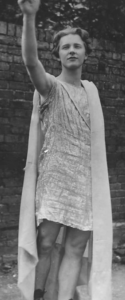
Was unimportant. Beauty so disposed
Him that the tunic didn’t matter. Still
All knew he wasn’t good at acting. When
It came to love, the man was quite a pill
To swallow. While he wrote to girls and men
He sometimes used the same words, letter to
This one, to that one, and another. Truth
Each letter might have been. If it were you
Receiving it, perhaps your guiltless youth
Might well have read his messages with hope,
But really Rupert had in mind a grope.
One letter to James Strachey took the cake.
Poor James had been in love with Brooke for years.
He made this plain as pain. His every ache
Of love for him he sent to Rupert. Tears
And loneliness were what he got in turn.
But then a letter Rupert sent him told him all
About the poet’s fucking of young Denham. Yearn
And yearn poor Strachey suffered. To appall
Him Brooke reported every detail of the night.
To Brooke the evening was adventure. He
Was out for conquest. Denham wanted quite
The most stupendous man in England. Glee
Is what they both got—touched with sadness, too.
That thing called love was not deployed for glue.
~ Phillip Whidden
On the Rubbish Heap of Time . . .
The one he loved the most was Charles Lascelles.
We have to take Brooke’s word for it that he
Was beautiful. As Rugby tower bells
Rang out the hours, a passion rhymed with glee
Pumped hard inside the future poet, hard
Inside like bell tongues that had learned to swell
Much more than sound, like anthems that bombard
A heart expanded with love’s holy spell
As anchorites accept the vision they
Can see upon the altar. Charlie filled
That view, an icon that could make Brooke pray
To, hoping for returned devotion thrilled
With Rupert. Images of Charles are lost.
We guess, but Charles’s beauty has been tossed.
. . . and Eternity
We know, though, that a photograph of Charles
Was kept by Rupert in his Cambridge rooms.
That’s it. Otherwise, cold ignorance snarls
At our pathetic wish to know. Blue fumes
As see-through as the scents from wicks are less
Than what exists of images of him. One scholar thinks
That one house-photo guy is Charles. A guess
Is all that is. History mocks and winks,
A callous god, as callous as the god
Of love, love tortured Rupert with his crush
On Charles who alone was never awed
By Rupert. Other boys were turned to mush
By Brooke. His beauty was extreme, but , no,
Lascelles was Rupert’s source of crossed-arms woe.
~ Phillip Whidden
Charles Lascelles Remembered
Imagine that an English boy loved you
The most of all — and everyone thought he
Was gorgeous…even straight men took the view
That he was stunning. Reckon that a scree

Of years goes tumbling by and both are gone,
Both you and he, and in this later age
The only reason that you’re not a yawn
Now, clean forgotten, is that on a page
(And on another and another) love
Stings, written out in passion near your name.
Imagine void . . . except that once above
All others he had cherished you. Your fame
Is only in those letters where he wrote
“Lascelles” because he licked your utmost throat.
~ Phillip Whidden
Trinity’s Anchorite in Gentle Agony
James Strachey, lacking goldsmiths’ stunning hair,
Sat by his non-gold fire alone inside
His Cambridge room and felt the flare
Of shrined romance within his ribs. It dyed
His arteries and veins the color of
A soul in paradise while also in
The Seventh Circle of Inferno. Love
Of Strachey’s sort for Rupert looms as sin,
As multicolored as titanium
Transfigured, hot. His paradise is just
As real. Inside James’ blow-torched cranium
He daydreams of the poet’s loving thrust.
Brooke’s snubbing of poor James calls in the Fates.
Noël’s and James’s sex affair awaits.
~ Phillip Whidden
The Mother of Rupert Brooke Reacted Strongly against Praise of his Physical Beauty
Modern poetry modern verse contemporary poetry contemporary verse modern poem contemporary poem
“Indeed, it sometimes seems that every person who ever met Brooke, and certainly every person who ever wrote about him, felt compelled to write down their impressions of his appearance.” ~ Keith Hale, Friends and Apostles: the Correspondence of Rupert Brooke and James Strachey, 1905-1914, p. 13
What must it be to be so hot that men,
All other men, are forced to say how stunned
They are by you, your looks. Yes, every pen
Of every man writes stark ink orotund
Encomiums on beauty, holding back
From slavering, barely. Then again it’s true
They focus on your face, your head, that sacque
Of richest hair of every perfect hue
You have to toss away from deep-set eyes
And poems’ forehead. Long the strong arched neck
A famous portrait shows. Men are wise
To hold back comments on it. Such would wreck
Their butchness, though one scoffer said in jest
As “actress” he was prettiest and best.
~ Phillip Whidden

Too Very Possible to Understand
“Born the second of three sons, Brooke was a deep disappointment to his mother, who had wished for a daughter. Brooke brooded over his mother’s sense of loss and the constant remarks of strangers on his skin that was ‘clear as a girl’s.’ He was inclined to comment that his mother’s wish for him to be a girl had created a feminine aspect in his nature, invariably mentioned each time he professed, in letters to . . . female friends, to understand woman’s nature. At other times he took refuge in his maleness; “I am a Man. Your letter was almost impossible to understand” ’ (Letters 399) .
His skin was so astonishing that men
And women, everyone, was forced to say
How beautiful and clear it was. So when
They spoke of it, they thought it held the sway
Girlish gorgeousness and this was so
Completely obvious that they were forced
To mention it. It troubled him to know
That all accepted mother’s hex, endorsed
Her desperation for the lad to be
A lass. She wished so hard that it became
Reality against her wish and he
Felt that his face and form had made him lame.
He felt he had to find a way to ban
The fault. He had to shout out, “I am Man.”
~ Phillip Whidden
Squares and Triangles
“male society, cloistered rooms, and the works of the classics” ~ Jacob’s Room, Virginia Woolfe
A cloistered room can be concocted in
An ordinary bedsit. Cambridge rooms
Are not required. You sit and rest your chin
On loneliness. Love’s sickness sends its fumes
To mesmerize you while you gaze upon
His face and head and shoulders in the frame
Around that photograph. You know you’d fawn
Upon him if he’d let you, but you maim
Yourself with slavering of soul despite
Sane brain cells. Years ago you said that he
Was Greek infinity. That thought was trite.
Of course you knew that. His divinity
Was angling on the school’s fields then but now
You torture heart valves, staring at that brow.
~ Phillip Whidden
Cool as a Thick-haired Cucumber
“I have need to busy my heart with quietude.” ~ Rupert Brooke
James suffered like a teenybopper lass
In love with manufactured pop star guys.
He hovered like an altar boy at mass
Outside the poet’s rooms. He hoped his eyes
Would see the lamp go on and then at least
Be sure the Presence and its holiness
Were near him. James was lesser than a priest,
A lowly worshipper. His lowliness
Compared to Rupert was like Shakespeare in
His sonnets begging both the boy and shared
Dark Lady for a chance. James didn’t win.
He only sorrowed and looked up and stared.
One time James met and asked him in the street
If he would call. He said “perhaps” they’d meet.
~ Phillip Whidden
A Solitary Fire
In bobby socks the teenyboppers used
To sigh or scream about a baritone,
Or tenor, or falsetto voice. Amused,
Their objects of desire jived through a zone
Of smugness like a phoenix on its pyre.
Before these screeching fans, James Strachey hunched
In front of uni lodgings’ mopey fire
And dreamed of Rupert. Strachey, sitting scrunched
Like Wile E. Coyote, gasped alone in
Sucked out ruination love. He sat
In love’s paralysis. Serotonin
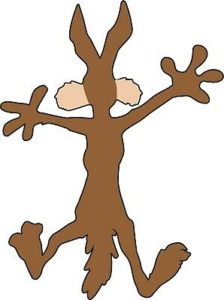
Left Strachey slumped like Wile E.’s flattened splat.
And did the poet care? No, not one jot.
The love of James was just a desert blot.
~ Phillip Whidden
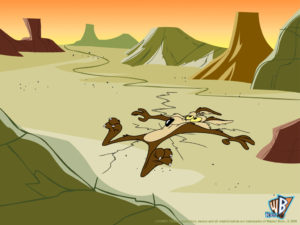
Messy Splendor; or, Splendor in the Weeds
Modern poetry modern verse contemporary poetry contemporary verse modern poem contemporary poem
Jacques Raverat said that Rupert Brooke clothed himself “in a dishevelled style that showed off his beauty very effectively”.
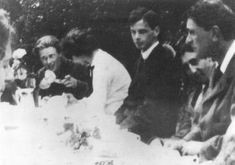 Jacques Raverat second from right
Jacques Raverat second from right
You’ve noticed for yourself that gorgeous ones
Don’t have to care about their clothes. They wear
Wotever since they know their beauty stuns
No matter what. A T-shirt, dirty pair
Of jeans, or un-ironed blouse will do. They throw
On anything they see along the floor
Or tossed on chair backs. Anything will show
That they are not like us. An opened door
(A closet) will reveal forgotten rags
And any item will suffice to make
The rest of us look blah who look like hags
And Harpo Marx, to make our egos shake.
Dishevelled stylishness is all they need.
Unfair esthetic gaps are pre-decreed.
~ Phillip Whidden
Niceness as a Weapon
A poet can’t be boring, that’s except
When sloughing off those arrogant demands
From men as snooty as Lytton. Inept
This hunter was. He never got his hands
On Rupert. Beauty and the Beast reborn
Was what that situation was. Brooke came
By invitation. Should beauty adorn
Apostles in their haughty, secret shame?
No, Brooke decided. He was very nice
To Lytton in the Strachey house, but that
Was it, a kind of nice more like smooth ice.
Brooke bored the Stracheys, shmoozed too nice in chat.
He left unsullied and untouched by James
And Lytton, nicely dampering their flames.
~ Phillip Whidden
Not Just Fame
Modern poetry modern verse contemporary poetry contemporary verse modern poem contemporary poem
“Sherril Shell’s Byronesque reproduction of Brooke’s own devising (the one his friends thought revulsive enough to dub ‘Your Favourite Actress’), takes precedence over his poetry.”
 Rupert Brooke
Rupert Brooke
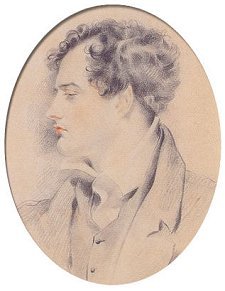 Lord Byron
Lord Byron
If Brooke himself devised this Byronesque
Arrangement, black and white, then maybe he
Was wiser than the rest. Too Junoesque
In beauty hovering, divinity
Upholding him forever after on
The photo printing paper, this cliché
(Though not cliché because the lovely swan
Is male and not a goddess) shows the way
To view this follower of Byron. Byron, too,
Loved boys and women not quite balanced in
Brooke’s life, but still . . . weighing this profile view
We reckon what this later Byron’s sin
Appears like. Gazing past the photo’s frame
He thought of boys and women, Zeus and fame.
~ Phillip Whidden
“unsettled by the devotion he aroused”
The complication with high carat gold
In men is no one knows quite how to cope
With “gorgeous” in a guy. His beauties scold
All those around him. Most go off and mope
Because they know they do not have a chance
At him or when competing with his charms.
His beauty acts like Teflon®. Just one glance
Deflects all hope. The beauty brings on harms
In all before him. He looms, David with
His sling, and those who might be giants find
That they are crumpled by the boy. The myth
Is brought to life in Rupert. All go blind
Like lumbering Goliath with the stone
Between his eyes. Both men and women groan.
~ Phillip Whidden
Approximating versus Knowing
He wasn’t photogenic, no, not quite.
Some formal portraits capture beauty, glow
Almost with glory, but don’t hold the might
To hint enough of what he had to show,
Why men and women staggered in their hearts.
These pictures made with cameras and with oil
Are lacking crucial force. They seem like charts
Of continents that cannot show seeds’ soil
Or Everest heights. His hair and flesh and face
Left people wounded and transfigured. Christ
Would know about such things and might abase
Himself, caressing while his side is sliced.
The beauty of this poet sliced right through
The guts of those who saw him. These ones knew.
~ Phillip Whidden
“Almost Ludicrously Beautiful”
“His looks were stunning – it is the only appropriate adjective.” ~ Leonard Woolf
“the handsomest young man in England” ~ W. B.Yeats
“He [Ganymede] was regarded as the most beautiful human on earth, male or female.” ~ Mythology Source
“the whole effect was almost ludicrously beautiful” ~ Henry W. Nevinson
I wonder what is wrong with women. They
Were offered classic beauty in a man
Who walked among them, beauty that would say,
Like lightning flashed from Zeus, its sky-wide span,
When first he saw his Ganymede, “Reach out
And have me, now, Now, NOW.” But most of them
Said no. Oliviers refused to shout,
“Come into me, Male Beauty. Lift my hem
And give me all your gorgeousness can shove
Inside.” Society beauties were far
Too stuck up. Even married men could love
His utter awesomeness, more than a star,
More like a constellation such as Zeus
Made Ganymede. Brooke’s beauty was profuse.
~ Phillip Whidden
Into
Deep
Water
Modern poetry modern verse contemporary poetry contemporary verse modern poem contemporary poem
In front of Brooke’s veranda stood a dock.
This wooden altar offered diving height

To deep blue water. He could interlock
With beauty, every beauty there in sight,
By diving into South Pacific waves
Especially if Taatamata saw
His arc. These two had entered love’s deep naves
Together. Rupert plumbed in her the awe
That he had always craved, that doubled love
We always search for. “Purepure” is how
They called him. (He was fair.) The sky above
Them arched to hold them: no black prayer book vow
Was needed. Deepest waters gathered both
Together. Love does not require an oath.
~ Phillip Whidden
Tropical Heat Meets English Poetry
Together Taatamata and taut Brooke
Spread open her vanilla orchid flower.
While it was tropic pink, not white, it took
His darker flesh invasion and its power.
Its power spread open her Tahiti flesh
And spread it, thrust it fleshy, veiny wide
For what he had to offer. Brooke left fresh
Off-whiteness there inside the pink, inside
Her willing wantonness. He shot its verse
So deeply in her slickenened heat, desire,
That she was stunned with maleness and its terse
Command, its terse demand, its ivory fire.
It splattered hotly there inside her, in
Her secret place, more beautiful than sin.
~ Phillip Whidden
Tahitian Light and Dark

They called him “Purpure” because his hair
Shone light instead of black like theirs. It shone
Of poetry, perhaps, or maybe flair
Of charm. Their combination might atone
For many sins and signally his spell
Translated clearly in their tropic parts.
He fell in love. Tahiti made love swell
In both directions. In warm tropic hearts
He found a new dominion. Cambridge ways
(And Rugby ways) had thwarted him in love,
Both boys and women. Then Tahiti’s days
Revealed to Rupert something far above
The tightness of his English past. Now nights
Of love showed beauties set beside dark lights.
~ Phillip Whidden
There’s Poetry and Then There’s Poetry
“There are three good things in this world. One is to read poetry, another is to write poetry,
and the best of all is to live poetry.” ~ Rupert Brooke.
The schoolboy grown to be a poet found
Intensest poetry inside the holes
Of men and women. Selfishly he ground
His way to heaven, tattooing their souls
With poetic thrusting and with semen.
Both they and he all thought that he was like
A god, part god and poet, a daemon.
He wrote white lines inside them with his strike.
The rumors are that he got women big
With more than poetry, with off-white verse,
But as for Denham Rupert danced his jig
Between his hips and left. That poetry was terse.
Tahiti’s Taatamata saved inside
Her something more sustained than Rupert’s sin.
~ Phillip Whidden
There’s Lucky and There’s Lucky
A girl with eyes involved with awe, and stroll
Of goddesses, and heart that angels knew
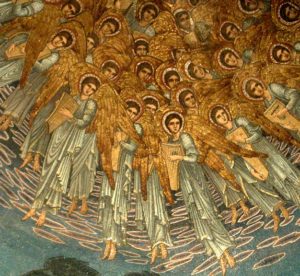
Who sang with Gabriel, would have a soul
To offer to a poet. She might view
Him as a blond and blue-eyed rhyming knight
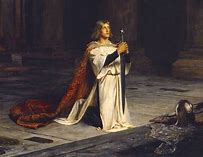
Descended from medieval realms where love
Was chivalry, descended from that height,
Descended like the Holy Spirit dove
Including man’s and poet’s tongue of fire
Upon her breasts, brown nipples, and her lips.
He turned to holiness the hot desire
That raised her banging heart and heaving hips.
He rammed in something rawer than his verse
And left her holding inner glow and curse.
~ Phillip Whidden
Taatamata and Denham Russell-Smith
The evidence, it seems, implies that stuff
With women caused him greatest grief, except
For Taatamata. Mother was enough
To force him to desire control. She kept
Him on the tightest lead as best she might
And love for Ka produced a nervous snap that sent
Him all around the world. One surging night
His love for younger males received assent
From Denham Russell-Smith who in return
Received command from Rupert. This control
Urged, utter, hard. In Rupert it was stern.
In Denham, welling up, the need was whole.
Assent is what the poet wanted most.
He got it from one hostess and one host.
~ Phillip Whidden
Brown Beauty and Others Left Behind
“more tourist still than soldier” ~ Rupert Brooke
America and Canada, their spine
Of Rocky Mountains, called across the sea,
Their men and women waiting, near supine
Already. Rupert left behind debris
Of men and women who had seen his nude
Self, naked as the men who modelled for
God statues for the Greeks. He left, all, crude
In breaking hearts. A white Tahitian shore
Called out to him and offered him a crown
Upon the head of perfect womanhood,
A crown of flowers for them both, this brown
Palm bending beauty with her sandalwood
Submission-giving poetry unmatched
Between her bedroom sheets with passion thatched.
~ Phillip Whidden
Boys, Even the Poets, Become Men
When boys at school grow up, they go away
And do the stupid things that boy-men do.
They go to bed with women, or if gay,
The boys make love while using cum as glue
With other men, and if they’re young enough,
These other males, they use them as their toys.
Sometimes there’s love. Sometimes the love is gruff.
If love like this is rough enough, there’s noise
Obscene to frighten horses in their stalls.
There’s poetry sometimes, if rhyming pole
Goes deep and hard enough for slapping balls
That try to cram themselves inside the hole.
Both Denham and brown Taatamata felt
Poetic beats from Rupert’s pubic pelt.
~ Phillip Whidden
The Flimsiness of Letters
“All the little emptiness of love!” ~ Rupert Brooke
What kind of letters? Letters in a clay
Configuration, cuneiform shapes gone
For thousands of declines in their array
In sunsets, twilights and each hopeless dawn
Were letters that avoided hope until
Some scholars cracked their code in Europe. Baked
Hard clay gave up its meanings. To distil
A letter on thin paper now long raked
By Brooke’s biographers is still a failed
Attempt. Perhaps it says that he had made
A child in Taatamata. Words are veiled
In broken English. Meanings are betrayed.
Her letter and its letters fail to speak
Their sense. Love’s flimsy essence turns oblique.
~ Phillip Whidden
Big Boy Hunk
m
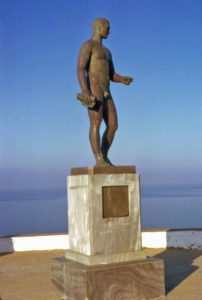
The Big Boy Hunk that isn’t Rupert Brooke
On Skyros is just too, too like the false,
False images built up around him, like a crook
Has pulled a dirty trick but wants to waltz
With you, no matter what. The Big Boy Hunk
Stands towering there above the profile made
Of metal on its squared up plinth. The junk
Between those thighs would never make the grade
In bed with Denham, Taatamata or
His worshipers post-death. The curves of “Brooke”
Himself are offset by the four by four
By four shapes underneath. They mock the look
Of him in life. Rectangles, squares, and straight
Lines contradict the truth of beauty’s weight.
~ Phillip Whidden
Going Clunk, Clunk, Spunk
The pedestals that hold him high, high, high,
Reveal the truth unwittingly. Inside
The straight rectangularities the sly
Truth comes in code. Still swirls all elide
In bending curvatures both dark and light,
The the swathes and the darker ones all say
He was not straight. Up at the very height
He poses as a bisex god. Dark gray
He stands upon the final plinth which tells
The lie again, just darker in its hue.
The lower curving patterns in their swells
Speak messages more certain and more true.
His metal muscles dark and hard and firm
Imply he made both boys and girls squirm.
~ Phillip Whidden
The War Poet
“a rich nature … fighting eagerly towards the truth.”
“I have a rendezvous with death
At some disputed barricade” ~ Alan Seeger
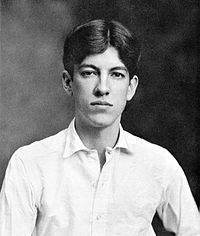
Alan Seeger
Not all war poets are the same as Brooke.
Not all are like a cabinet display
Of Royal Worcester china in a nook,
A corner of his mother’s lounge in gray
Light, George in distant London on the throne,
Some, gung ho patriots, or others skilled
In truth, some full of agony and groan.
Most beautiful of all was Rupert, killed
Before Gallipoli, before he saw
The facts of bayonets and bullets, gas,
Bombardment, blasted brains, the cannon’s maw,
Or murder’s shine on casings made of brass.
In innocence he sailed to meet his fate.
He did not know of Seeger’s barbed wire weight.
~ Phillip Whidden
Not Religion but Death
At first church fame held up his lines to heights
Near immortality. Saint Paul’s robed Dean
Had read “The Soldier” in the lectern rites
Of Christ’s domed space before the altar screen.
It seems that Brooke knew this. He did not know
How close to death he moved across the sea.
That reading made him famous but the glow
Of rhymed eternity produced its plea
By sending a mosquito to his lip.
It sucked out life from him. A fever came.
He sank towards void upon the sail-less ship.
Death conquered, feeling not one shred of shame.
Death fails to feel regret because it claims
To lift his poetry with deathless flames.
~ Phillip Whidden
England’s Inoculation and Therapy for the Virus Called War, April 4 and St. George’s Day, 2015
Fate slapped him in his face and carried on
With tattooed beauty on its fingers, palm,
And skin much longer like a lingering dawn.
His sonnet read out loud as if a psalm
In London’s main cathedral by the Dean
On Easter from the pulpit days before
The poet’s death on Shakespeare’s date, was seen
By all the next day in The Times. Fate’s sore
Was opened, though, by one mosquito bite
Upon the poet’s lips. It killed him like
No kiss that Brooke had known, not in a night
With Denham or Tahiti, like a spike
Or bayonet akin to what Brooke shoved
Up toward their hearts, those two whom he had loved.
~ Phillip Whidden
Empty Charms Replaced His Stunning Charm — Two Sutured Sonnets
The media in ignorance gets in
The way of people’s understanding of
The truth. They put a glossy glamor spin
On heroes and then shy away from love
That falls outside the types that Christians would
Approve of. Once the bug-bit Rupert Brooke
Was dead, the papers stuck to what was good
For women’s sentiment. An inglenook
In which he shared his body with a guy
Or tropic love resulting in womb
Filled, mixed race-wise, would surely be awry.
No hint of this would decorate his tomb.
An airbrush would have been applied to save
His beauty in reports about his grave.
The readers would not know about his friends’
Determination to wrap round his loss the view
That somehow poetry could make amends
For his pale septic death. His eyes of blue
Were like the epic sea around the isle
Where he was buried, Skyros. Just from there
Achilles left for Troy, his cross-dressed guile
Defeated. Though this didn’t really square
With heroism, Rupert’s friends were sad
Enough to grasp this mythic straw to bend
His death to something noble. They were glad
To make this link to glorify their friend.
Besides, the death of Theseus was here.
They clutched at details from the epic sphere.
~ Phillip Whidden
Blending
Until the centuries come and blur away,
Until they come and go like spirits, or
Like ghosts, let us, together, come and sway
As one, if that be possible. Let each one’s core
Become the other’s by a blending of
Our souls and bodies. I will wear my shirts
Which Ka has made until we find our love
When clothes come off and we have raised your skirts.
I want a sacred bond that life could not
Propose with Denham, or with Charles, or James.
I want a frenzy, elements all hot,
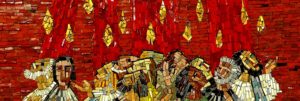
A Pentecostal pact with hovering flames.
Let’s make our love eternal here in time,
A thing of chant-like ecstasy and slime.
~ Phillip Whidden
A Hovering Sexual Position
Modern poetry modern verse contemporary poetry contemporary verse modern poem contemporary poem
The poet, Rupert Brooke, felt trouble with
Deciding what his sex position was.
He listened to his gay friends’ favorite myth
That what they did with males, those touched with fuzz
Around their genitals, was normal as
Banal sex stuff in marriage beds. When James
Desired him to perform his sexy snazz
In him, Brooke nixed that form of manly flames.
Noël was whom he wanted to deep poke,
But she rejected Rupert. After he
Was dead, Noël took Rupert’s would be bloke,
James Strachey, in her hole she used to pee.
Imagine Rupert floating low above
Them, ghostly, just as James began to shove.
~ Phillip Whidden
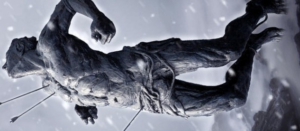
Wince
“Hynes succeeds in reducing Brooke to two pitying, scathing lines: ‘Poor Brooke: it is his destiny to live as a
supremely poetical figure, shirt open and hair too long and profile perfect – a figure that appeals to that vast
majority that doesn’t read poetry, but knows what a poet should look like. But as a poet he is not immortal – he is only dead. . .’ ”
Fair youth, beneath the trees, thou canst not leave
Thy song . . . and for ever young
. . . Forever England
The situation might have been far worse.
Brooke might have been an ugly little wimp,
Poetic as a Walter Mitty. Verse
By Rupert might have been forgotten, limp
As mashed potatoes when they’re warm. His shirt
Instead could be high-buttoned up and hide
An unpoetic chest, his hair too curt
Like most young men’s, his forehead, low, astride
Two boring eyes and prose-like cheeks (instead
Of noble wide-boned beauty) and a face
In profile like an E. M. Forster head,
No face as graceful as a Grecian vase.
His readers may not know his poems well,
But they know him. The rest can go to hell.
~ Phillip Whidden
A Diminished Thing
We’ll never know what Rupert looked like at
The age of 69, his hair thinned out
And lacking luscious lustre, dull and matte,
A would-be brassy wheat field in a drought.
We’ll never know what Rupert looked like when
His skin sagged sallow on his slumping cheek
Or when his hips began to hollow, pen
Run out of ink, their juiciness gone bleak.
We’ll never know what Rupert Brooke looked like
When hairiness on calves and thighs began
To fail with graying hair above his spike,
That veiny one, when lines lost rhymed elan.
We think of Wordsworth writing at his worst
In later years with poems shrunk and cursed.
~ Phillip Whidden
“Mythical Land of the Ever Young”
“I can’t help feeling that he has been smothered and castrated, and there he is,
quite different, and memorable, could we disinter him.” ~ Virginia Woolf
“They shall grow not old, as we that are left grow old:
Age shall not weary them, nor the years condemn.” ~ Laurence Binyon
